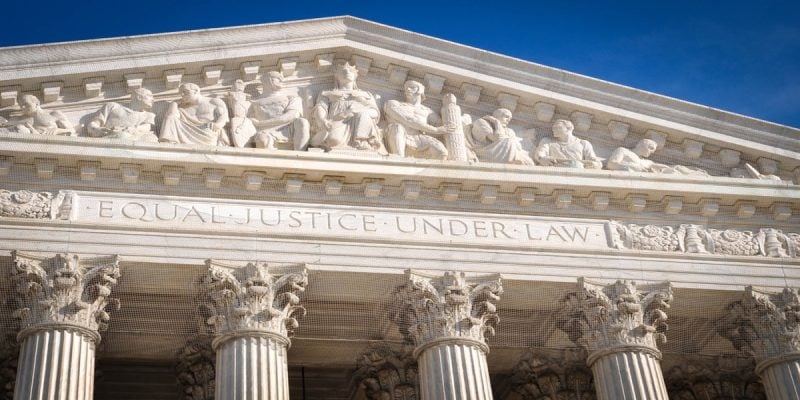A decision Monday from the nation’s highest court solidified tribal online gaming in the state of Florida.
The US Supreme Court declined a petition from West Flagler Associates to review its challenge of the Seminole compact with the state of Florida.
By denying the writ of certiorari, SCOTUS leaves intact a ruling by the DC Circuit US Court of Appeals that compacts under the Indian Gaming Regulatory Act (IGRA) can include off-reservation online gaming as long as the activity is agreed to by the state and legal under state law.
The decision ensures the Seminole Tribe can continue offering online sports betting in Florida through its Hard Rock Bet app, which it relaunched in November after the Circuit Court ruling.
Seminole spokesman Gary Bitner issued a statement:
“The Seminole Tribe of Florida applauds today’s decision by the US Supreme Court to decline consideration of the case involving the Tribe’s Gaming Compact with the State of Florida. It means members of the Seminole Tribe and all Floridians can count on a bright future made possible by the Compact.”
The ruling could also allow tribes nationwide to include online gaming in state compacts if it is allowed under state law. In Florida, the Seminoles could look to expand their gambling options to include online casino.
History of Seminole compact legal challenge
West Flagler originally challenged the Seminole compact in US District Court soon after it received legislative approval in 2021. West Flagler led the way for many commercial gaming companies displeased with the online gaming monopoly the compact granted the tribe.
The Florida parimutuel company filed West Flagler Assoc., Et al. v. Haaland against US Secretary of Interior Deb Haaland, saying she erred in allowing a gaming compact including online sports betting off Indian lands under IGRA.
Judge Dabney Friedrich agreed, ruling the court cannot accept the fiction that all sports betting occurs at the location of the tribe’s servers.
The DC Circuit overturned the lower court’s decision, determining the compact only authorizes the betting that occurs on the tribe’s lands. The online sports betting mentioned in the compact is a separate agreement between the tribe and state that doesn’t fall under IGRA but could still be part of the compact.
In February, West Flagler filed the petition asking SCOTUS to review the case.
SCOTUS decision explained
The Seminole compact established that statewide online sports betting took place on tribal lands based on the location of the server on tribal lands.
Only the district court ruled on that issue. The DC Circuit concluded that the Seminole compact includes but doesn’t authorize the online wagering taking place off tribal lands.
Supreme Court Justices conferenced last Thursday to consider the petition.
Four of nine Supreme Court Justices had to want to take the case. Only Justice Brett Kavanaugh wanted to grant the writ of certiorari. Justice Kentanji Jackson took no part in considering the petition.
No comments explaining the denial nor dissent were issued.
In denying a stay of the DC Circuit ruling until the Supreme Court decided whether to take the case, Kavanaugh had opined:
“If the compact authorized the Tribe to conduct off-reservation gaming operations, either directly or by deeming off-reservation gaming operations to somehow be on-reservation, then the compact would likely violate the Indian Gaming Regulatory Act, as the District Court explained.”
Kavanaugh added that the Florida statute giving the tribe exclusivity over online sports betting raised “serious equal protection issues.”
Tribal ramifications of Supreme Court decision
By allowing the DC Circuit decision to stand, the Supreme Court tacitly gave Indian tribes nationwide the greenlight to include online gaming in state compacts as long as the gaming is allowed under state law.
This means that other tribes around the nation could begin including online gaming in compacts with the state rather than entering commercial agreements, as tribes have done in Michigan and Arizona.
Earlier this year, the Department of Interior finalized rules making official that the DOI will approve compacts with internet gaming as long as state law and the compacts deem the betting to take place on tribal lands, where the servers are located.
Scott Crowell, a longtime tribal attorney with particular experience representing tribes in California and Arizona, told PlayUSA:
“Today’s decision was expected but still very welcome news as it validates that tribes are able to offer statewide mobile gaming under IGRA. The position advocated by Florida’s card rooms that IGRA could actually be used to prevent tribes from participating in the largest expanding sector of the gaming industry would have turned congressional intent in the passage of IGRA on its head.”
Options for West Flagler to continue compact challenge
Although SCOTUS has the final word on legal issues in the United States, West Flagler does have options to continue its challenge of the Seminole compact.
West Flagler’s challenge could continue at the state level. West Flagler already tried to get the Florida Supreme Court to rule that the governor overstepped his authority by signing a compact that included online sports betting. The highest state court declined to hear the case.
West Flagler could challenge in Leon County Circuit Court that the compact violates state constitutionality that the people of the state approve any expansion of gaming.
Florida-based gaming attorney Daniel Wallach said West Flagler also could file an equal protection lawsuit in Tallahassee federal court, citing the earlier Kavanaugh statement. Or it could challenge the new DOI rule in federal court.
Because the DC Circuit didn’t specifically rule on whether online gaming servers being located on tribal land satisfies the requirements for gaming under IGRA to take place on tribal lands, Wallach doesn’t believe this will be the last the Supreme Court hears about online gaming under IGRA.
Wallach posted on X (formerly known as Twitter):
“It seems unlikely the DC Circuit’s decision will be the last word on the ‘compactability’ of internet gaming. SCOTUS will weigh in at some point and resolve the uncertainty over IGRA’s scope.”
Wallach filed an amicus brief with the Supreme Court in support of West Flagler’s petition. In the Supreme Court filing, Wallach cites a PlayUSA article on how the DC Circuit decision could eventually facilitate tribal online sports betting and online casino gaming in California.
Decision could spark Florida online casino effort
Seminole Gaming CEO Jim Allen told PlayUSA in April that a favorable US Supreme Court decision on the compact challenge could lead the Seminole Tribe to begin pursuing Florida online casinos through the legislature.
“I think that, No. 1, if the case was resolved in our favor, we would then have to reinitiate conversations with the governor’s office, the House and the Senate. And then that becomes a political process that we would navigate through.”
Originally, the compact agreed to by the Seminole Tribe and Gov. Ron DeSantis set the stage for future online casino discussions.
It included language instructing the state to begin good-faith negotiations with the tribe on Florida online casino within 36 months of the compact going into effect.
In approving the compact during a special legislative session in 2021, the legislature removed mention of iCasino.
With the statewide online sports betting model now cleared federally, the tribe could look to ignite those discussions with the state as soon as next year.
Related Post: What Are the Revenue Projections for Florida Online Casinos?








